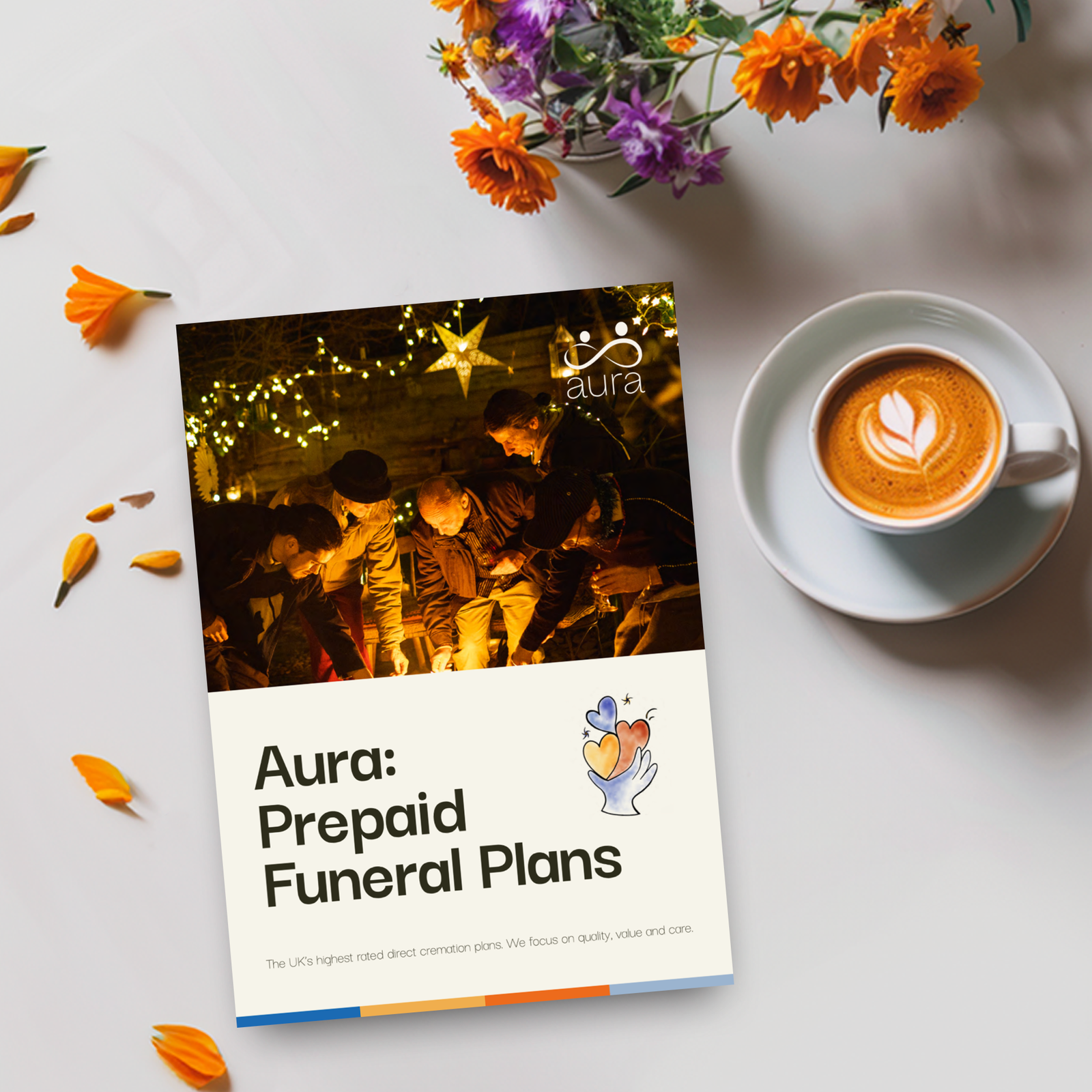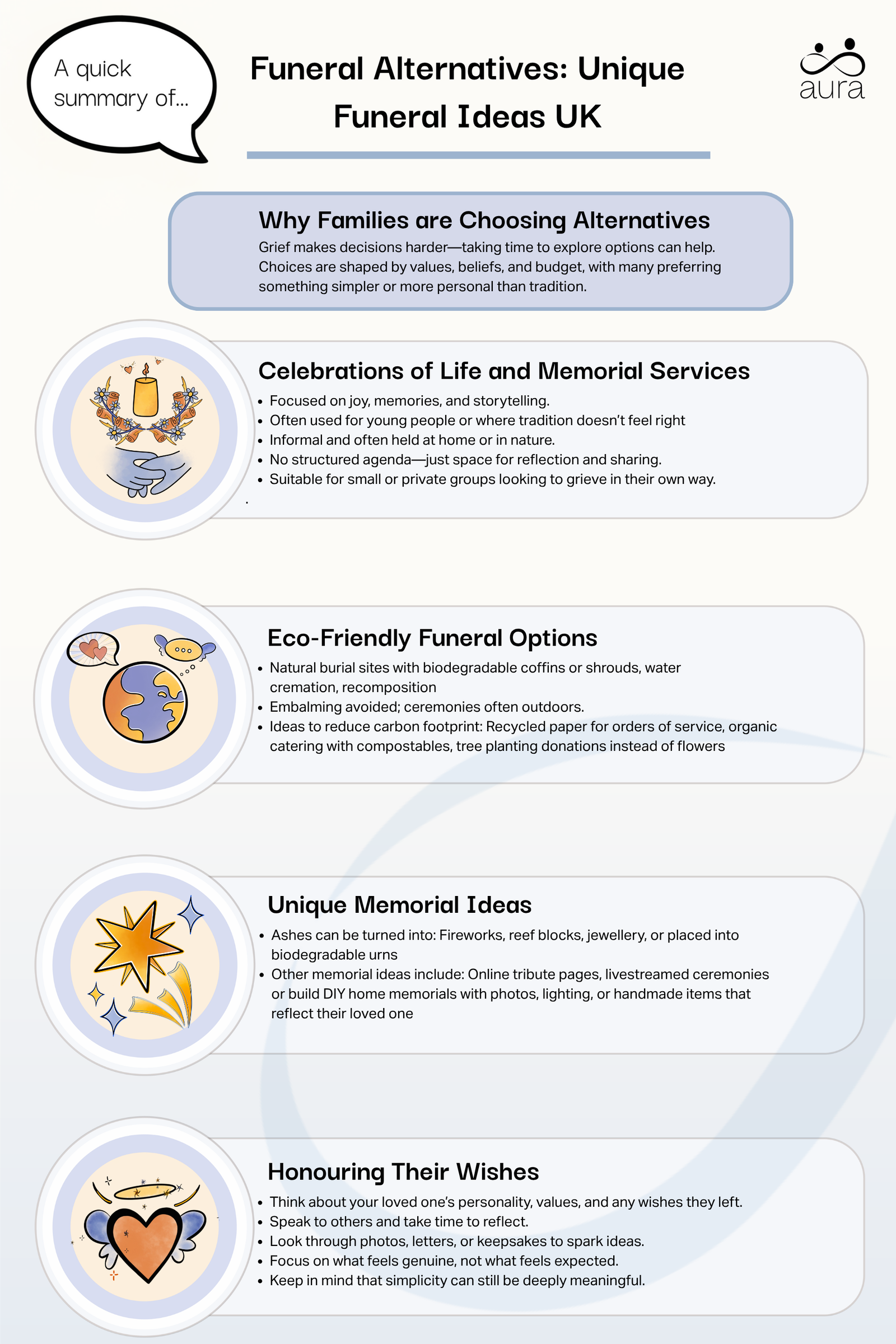





Written by Adam McIlroy.
20 minute read
There is an increasingly wide array of funeral options and alternatives in the UK to choose from, including woodland burial. And now, more than ever, British people are feeling that the traditional norm doesn’t suit them, preferring something different. In this article, we want to take a closer look at what funeral options are out there, and some of the alternatives to tradition that are growing in popularity. Additionally, exploring other unique funeral ideas can inspire a truly personalised send-off beyond these common options.

For those searching for a funeral option, there are now far more choices available to them than in recent years. There has been a decline in religion in the UK in recent decades, which means there are fewer people being driven by beliefs on death and funerals in religion when they are organising their own funerals.
As such, aside from the typical options of the traditional cremation or burial, a whole host of other options has started to proliferate. From the now widely popular direct cremation; to water and eco-cremations; to natural burials and burials at sea; and funerals conducted by funeral celebrants, or even DIY funerals, the list is nearly endless.
The wideness of options on the market reflects a growing trend among British people not to simply settle for the traditional model because it’s the ‘done thing’, but instead to search for the option that works best for them. What decision you make for your funeral — one of the most important parts of end-of-life planning — will rest on financial, cultural, and personal considerations.
The traditional funeral options in the UK generally pose the choice of cremation vs burial. In general, despite our declining religiosity, many people still find the idea of a traditional funeral as something comforting, which explains its enduring adoption across the UK.
Cremation services are one of the two main traditional funeral options out there. With this approach, the family and friends of the person who has died normally attend an organised service at the crematorium’s chapel. The content of the ceremony need not be religious, and can be delivered by a funeral celebrant instead of a religious figure if preferred.
Fully attended services last between 30 minutes and 1 hour depending on the crematorium. The person who has died is often brought to the crematorium in a hearse, which may even form a funeral procession; floral tributes to them often adorn their coffin. Pallbearers will then bring the coffin inside the chapel and place it on the catafalque. People like to choose music to play from among the best funeral songs, which can make the ceremony feel more meaningful.
According to SunLife, the national average total cost of a funeral is £5,140. Aura’s direct cremation prices for funeral plans, by comparison, start at £1,695 — less than half the price.
Burials are the more expensive of the two traditional options. The format is often very similar, usually including hearses, floral tributes, pallbearers and processions. But the way the person is laid to rest is different, seeing them buried in a cemetery or church yard. It’s this element that adds the extra cost, and brings in an element of regional price variation. A funeral at a church is probably more likely than not to have a religious theme, including the use of the most popular UK funeral hymns. With that said, it’s not necessary for a burial to be preceded by a church service, as cemeteries can also be owned and administered by the local council.
A burial plot needs to be rented, and a headstone needs to be commissioned; these can add significant cost to your overall funeral expenses. According to Legal & General, the average cost of a burial in the UK in 2024 was £5,894, but this increases to £8,800 in the Greater London area, where space for burial plots is severely limited and thus more expensive.
There is an increasing array of alternative funeral options to the traditional norm available in the UK.
An alternative funeral is any farewell that departs from traditional expectations through small personal choices in tone, venue, dress, music or format.
Direct cremation is a form of funeral which focuses on the cremation process, stripping back a lot of the extras that make it hard to keep funeral costs down. It is, naturally, quite similar to a standard, traditional cremation, but with a few key differences. With Aura, the person who has died is brought to the crematorium in a private ambulance, rather than a hearse, without floral tributes or pallbearers. They are then brought inside directly to the catafalque in the crematorium chapel. There is not normally an attended service with a direct cremation; instead a crematorium attendant speaks a few words out of respect, and then, as soon as possible afterwards, the cremation occurs. With that said, some providers including Aura does allow the option of attending a direct cremation, if preferred.
This has the impact of making the process much more concise and affordable. Our direct cremation services are available at less than half of SunLife’s average British funeral cost from last year, starting at £1,695 for our funeral plans, and £1,195 for those requiring our help in the here and now. If you are interested in learning a bit more about how our direct cremation plans work, and the different options that we can offer you, please feel free to download our funeral plan brochure.

If you’d like to know more about how to plan a cremation with Aura, our brochure is a helpful place to begin.
Our funeral plans are a helpful way to put everything in place for you or someone else.
When the time comes, our experienced team will be here to guide you through each step, offering support and advice whenever you need it.
To find out more about how our plans work, what’s included, and our story, you can request a brochure by clicking the link below. We will then send you a copy by email or First Class post—whichever you prefer.
With the climate crisis becoming an ever more pressing problem, many of us want our last act to be one that does as little harm to the planet as possible. This explains the growing popularity of green and eco-friendly funerals. This can be done with small, eco-conscious practices, like having the funeral in a local place as near as possible to family, whilst allowing loved ones to digitally send love and support from afar. Others choose to be cremated or buried in a simple shroud, or opt for a biodegradable coffin. In fact, many woodland burial sites now require this, along with no embalming, to protect the natural environment. Headstones are often not allowed either. Instead, graves may be marked with a tree or wildflowers, helping the area remain a peaceful, living landscape.
There are more impactful choices we can make too, such as having a water cremation, which can use up to 90% less energy than a normal cremation. Normally, they burn the coffin at a cremation, but with this kind, there need not even be a coffin. Alternatively, a natural or green burial can be held in rural locations, such as woodland, which could have the potential positive impact of helping to boost the growth of local flora and fauna. Depending on where you opt for, cost could vary between a few hundred and several thousand pounds.
In conjunction with the growing preference for something like a more personalised and unique celebration of life after a funeral has been conducted, more of us are turning to humanists and celebrants to lead our funeral ceremonies. Rather than the services of a religious figure, who might draw upon a majority of religious material, a celebrant or humanist has a lot more flexibility to create a personalized funeral alternative.
A humanist, in accordance with their principles, will completely forgo religious elements in their services, helping families to design something that avoids this altogether. A celebrant, on the other hand, can incorporate religious wording and music if preferred by the family, at the same time as personalising and theming the service according to their wishes. Celebrants therefore give families the chance to have the best of both worlds. Whereas humanists offer the ability to have the comfort of an ordered service, using material like non-religious funeral poems, but without ideological or spiritual incompatibilities.
Not everyone wants a traditional funeral. Some prefer a more flexible memorial that focuses on the person’s life, personality, and the memories they’ve left behind without needing the body or ashes to be present.
These gatherings can be simple and personal. You might include music, readings, or shared stories. Some families choose colourful dress codes, memory tables with photos and keepsakes, or symbolic tributes like candle lighting or tree planting. This kind of memorial often pairs well with a direct cremation, giving families time to plan something meaningful, without the pressure of doing everything at once.
If you’re planning a celebration of life and want to make it feel personal, our article on funeral wake ideas can help you find inspiration for decorations, music, and small touches that bring people together.
Some people choose what’s known as a DIY or family-led funeral, where the family arranges as much of the funeral as they wish. This can be a personal and meaningful way to say goodbye.
With a typical funeral, a provider like Aura usually takes care of everything from paperwork and transport to coordinating with the venue. Funerals can be complex, with legal and emotional elements to manage.
In a family-led funeral, the family takes on more of this themselves, often for cost reasons or to feel more involved. You can also choose to combine this with professional help with paperwork or logistics, if that feels right. It’s completely legal to arrange a funeral yourself, and there’s no requirement to use a funeral director. It doesn’t have to be all or nothing. Many families mix and match support depending on what they need.
You can have a funeral for a loved one at home before burying them on your own property, or on private land where you have the owner’s permission. It is not against the law, but there are certain rules you will need to follow. For example, the gravesite must be away from water sources, drainage, cables, or gas supplies. The grave also needs at least one metre of earth beneath the coffin, and at least one metre of earth above it, to prevent disturbance by animals.
You may wish to consult the local council for advice on how to dig a compliant grave and choose the best location on your property. It’s also important to record the burial on the property deeds, as this may affect the future sale or value of the land. You will need to manage all the necessary paperwork yourself if you decide on this approach.

There are a whole host of ways to make a funeral service unique, from personalising the theme, to having a virtual or online memorial service, to memorial art and tributes. Exploring a range of funeral and memorial ideas can help you create a truly meaningful tribute that reflects the person’s life and values.
The different beliefs on death and funerals in religion usually lead to a strictly mandated funeral in a traditional format, in accordance with the principles of each faith. But with fewer and fewer religious funerals happening in the UK, more and more space is opening up for people to personalise their funeral ceremonies. They can do this by assuming more control over each element, from dress-codes, to incorporating video, and music. Design of a visual theme tailored around the interests and tastes of the person who has died is also becoming more common, with funeral celebrants able to assist in the tailoring of everything.
During the Covid pandemic, during which, thanks to government-mandated restrictions on our movements, we were unable to attend funerals, the practice of the virtual or online funeral began to gain popularity. It allowed people to still feel as if they were there in person, and to be able to take the time to meaningfully pay their respects to those they had lost. With the increasingly ‘online’ nature of the rest of our lives, it seems inevitable that the same trends should impact the funeral process too.
Today, in a post-pandemic world, the practice of hybrid or fully remote work has swept the globe, where it was once only a niche occurrence. Today, many funerals integrate an online element, or are otherwise fully remote, which allow the family arranging matters to maximise the number of attendees without having to worry too much about the cost. It also allows those who may be living far away and who are unable to travel to pay their respects in a socially acceptable way.
If you want to plan your own funeral today, you are more likely to give some attention to memorial art and tributes than ever before. People like to be able to leave a little piece of themselves behind for their friends and family, which they can do by having art commissioned, whether in the form of poetry, stories, or of visual art, such as portraiture. These can become valuable keepsakes which steadily accrue more and more sentimental value.
Something people have done for many years is the donation of their body to medical science. Apart from being something that is at once selfless, exemplary of humanist beliefs, and very cost effective, it also has a much-reduced impact on the environment too.
In donating our bodies to medical science, we can help to enhance human knowledge and understanding, training new medics and doctors in anatomy with real bodies, and offering inexperienced surgeons the chance to practice their skills.
In order to donate your body to medical science, you will need to contact your local medical school for further direction and to register your interest, who will provide you with consent and registration forms to fill in. Those living in Scotland can start the process by heading to the Scottish Government website.
If you want to do this, it is essential that you communicate your wishes to your family, loved ones, and executors of your estate, which may require you to talk about death and dying with them, if you haven’t already. When you are writing your will, you may wish to include a section on this, making it clear what your intentions are. They can then organise an end-of-life celebration after your death in order to pay their respects to you.
To put it bluntly, funeral costs are rising. According to the SunLife Cost of Living Report, the national average total cost of a funeral is £5,140. The average cost a traditional attended funeral has risen 5.3% from 2024 to 2025.
All of this is having a greater impact on our funeral decision making. Many of us are wondering how to get help with funeral expenses, or whether we can attend a public health funeral. As noted above, the national average total cost of a funeral is £5,140, whereas direct cremation can be significantly less expensive than this. In fact, Aura’s prices start at less than half of that figure. It’s worth noting that alternatives aren’t automatically cheaper; bespoke choices such as themed venues, specialist transport, or custom coffins can add significantly to the overall cost.
If you’re wondering what is a funeral plan, it’s a way to arrange and pay for a direct cremation in advance. Aura offers its prepaid funeral plans from £1,695, and it works by letting you lock in today’s prices for your own future funeral, whenever that may be. This is clearly an effective way of combatting the problem of rising funeral costs. We place the money for your funeral and place it into our secure, independently managed trust, where it will stay until the day it is needed. It means that your family won’t have a penny to pay when the time comes.
Our funeral plans are completely safe, as we are fully regulated by the FCA, and all of our plans have FSCS protection. There are many different ways to pay for a funeral, so you will have to decide which one works for you (for instance, by considering funeral plans vs 0ver-50s life insurance).
In order to make sure you are getting the best deal it is important to see what is out there on the market. You can, for instance, compare Aura funeral plans with other leading providers to see how we sit next to other examples. You can also head to objective consumer information websites like Martin Lewis’s Money Saving Expert for impartial information about prepaid funeral plans. You can also take a look at the below table for more information. The important thing to remember is to make sure you understand what is included in your final quote, and to make sure that there are no hidden fees.
| Fairer Finance | |||||
| Starting Price | £1,695 | £2,095 | £1,700 | £1,885 | £1,595 |
| Trustpilot | 4.9/5 stars | 4.8/5 stars | 4.6/5 stars | 4.4/5 stars | 4.9/5 stars |
| All-Inclusive Pricingℹ | |||||
| Free Cancellation Anytimeℹ | |||||
| Money-Back Guaranteeℹ | |||||
| Solvency | 128% | 124.8% | Unknown | 138% | Unknown |
| Transparent Pricingℹ |
Ultimately, whatever you decide to do — whether you opt for a traditional burial, a direct cremation, or a burial at sea — your decision will rest on several different factors. Most likely, you will be weighing up a balance of your cost needs, with your spiritual, cultural, ideological or religious preferences. You will also want to consider how you want to pay for things, and whether you’d like an unattended or an attended ceremony.
It can be a lot easier to make the decision by discussing it with your family. Not only will they be able to feed into your ideas, point out matters you may have forgotten to consider, and ask any questions about things which concern them, but it can also help them to remember a loved one and deal with their grief more effectively. Being more aware of your preferences means they will be more ready and able to help put things in place beforehand, and to bring it to fruition when the time comes.
We hope that this article about your funeral options and alternatives in the UK has proved useful for you, and helped you to get started with thinking about the subject. It can be quite daunting, but the first step is always the most difficult.
Aura is the UK’s top-rated national provider of ‘Cremation Services’ on consumer ratings platform Trustpilot, with a score of 4.9/5 stars. We’ve earned this through offering our services with a uniquely compassionate and people-centred approach to our care, and the families who’ve entrusted their funeral arrangements to us have valued this.
We are a family-run company, and that ethos of care runs from top to bottom. We were founded by Paul Jameson, with his son, David (our CEO), and Ben (our COO), after Paul was diagnosed with motor neurone disease. Today, he continues to run the company, determined to transfer the knowledge he’s gained about facing mortality to all families in need of our services across mainland Great Britain. Our mission is always only to offer you the quality of service that Paul would expect for his own family – no less.



If you have any questions, would like a brochure or simply would like a chat through our services, our award-winning team is here to help.
Unlike other providers, we won’t hassle you with constant calls. We’ll simply ensure you have the information you need and leave you to come to a decision in your own time. When you’re ready for us, our team will be ready to help.
Yes, there are several alternatives to a traditional funeral. Many people now choose direct cremation, which takes place without a service or ceremony at the time. Others may opt for a DIY funeral, home funeral, or even donate their body to medical science. Some families also choose to hold a memorial service at a later date, or organise a personal celebration of life that suits the wishes of the person who has died. These alternatives can be more flexible, personal, and often more affordable than a traditional funeral.
The cheapest alternative is usually a direct cremation. This is a simple, dignified cremation that takes place without a formal service or attendees present. Aura’s direct cremation starts from £1,195, which is far less than the national average total cost of a funeral (£5,140). It includes everything needed for the cremation, and families can choose to hold their own private memorial or remembrance event separately, in a way that feels right for them.
If you don’t want a traditional funeral, you have several options:
Direct cremation – a simple, unattended cremation without a formal service.
Body donation to medical science – a selfless, cost-free option that contributes to research and education.
DIY funeral – where the family takes on the organisation themselves, often with limited professional involvement.
Home funeral – held on private property, with or without burial (subject to legal guidelines).
Virtual or online memorial – allows friends and family to gather remotely to share memories and say goodbye.
Personal celebration of life – a more informal, non-traditional gathering, which can happen before or after cremation.
Each of these gives you more control and flexibility, letting you choose something that better reflects your values, beliefs, and budget.
All funerals must meet certain legal requirements, such as obtaining a death certificate and, in some cases, a burial or cremation permit. It’s essential to check local regulations.
Research local funeral directors who specialize in alternative funerals, or look for recommendations online and through community groups.